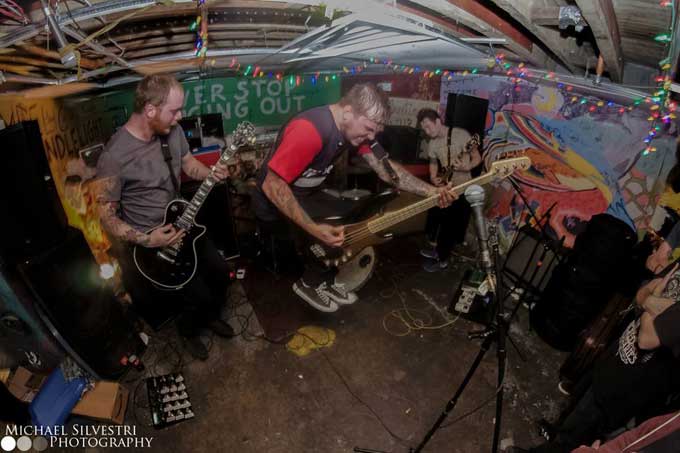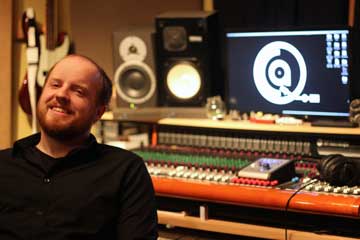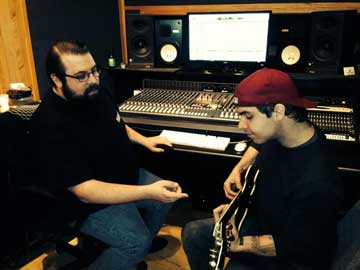Do-It-Yourself or DIE trying!
by Jeffrey Czum

Help Yourself
Do-it-yourself or DIY is nothing new in the music industry. Punk musicians of the late 70s and early 80s, who were consistently rejected by major labels booked their own shows, paid for their own studio time, pressed vinyl or cassettes of their music, made and sold their own tee shirts and gave a big “fuck you” to the record industry. Outcasts like Black Flag, Minor Threat, and the Dead Kennedys built international followings and still kept their fuck you attitude.


Things are different today. What was revolutionary in the 1970s and 1980s is now the predominant way things are done by up and coming musicians. It’s all DIY with the added power of the Internet and social media. iTunes has become the new distribution center, Twitter has replaced the immediate need for a publicist and Facebook has become a great outlet to reach fans in other cities across the world.
“The growth of social media has given artists the power to reach every house and smartphone around the globe,” said Dennis Ferry a talent buyer for Chris Ring’s concert promotion company After Dark Entertainment.
“It allows great access for artists, but it has also caused a flood of musicians fighting for attention amongst thousands of others,” Ferry said.
The music industry, especially the scene in Buffalo is a competitive market. With instant access to online platforms, smart bands use these tools to stand out and brand themselves. But is that enough?
“As more bands utilize digital marketing and platforms like Facebook to continue to back their advertising model, it’s become more important than ever for musicians to get back to the basics and forge a genuine connection with music fans. That means having a great live show, good songs, and a direct dialogue with listeners,” Ferry said.
“I’m a firm believer that the best way to build a band is by working hard and getting out there, playing shows, writing great songs, and connecting personally with your supporters,” said Ferry.
“Doing it ‘DIY’ and forging real connections with people is a band’s best chance at career longevity. Independent bands in 2015 can find every venue, promoter, and band in any city in American thanks to the internet. But at the end of the day, nothing replaces good songwriting,” Ferry said.
Digital recording has completely transformed the economics of the music industry. In the past artists like a Jimi Hendrix, Led Zepplin or the Beatles racked up hundreds of thousands of dollars in recording studio time taping their music to two inch recording tape on analogue machines. They had a slew of engineers, a producer, long mixing sessions etc. Making changes to the music was a tedious and expensive process. Today a small studio can produce a better quality recording with equipment that costs tens of thousands of dollars instead of millions.
What does this mean to the DIY artist of 2015? It means an artist today no longer needs a major label to foot the bill for them to record.
The same equation plays out across the board for an aspiring musician. Desktop publishing means they can design and print their own posters, flyers and other marketing materials. Twitter, Facebook, Bandcamp, Soundcloud and various music blogs, etc. mean artists don’t necessarily need a major label to market them any longer.
Jay Zubricky of GCR Audio and Paul Besch of Quiet Country Audio are two producers/engineers working within the Buffalo music scene. They’ve both produced and recorded great local and national acts and know what it takes to build a strong reputation as an independent musician.
“With the strength of where social media is now, more bands are fighting for the same slice of pie,” Zubricky says.
“By branding themselves, and creating a strong reputation, you have the ability to stand out from the others. You have to be known as the band that works harder than anybody else. no one is going to do that for you,” He says.
“When recording, I always like to work with bands that are willing to put in the hard work,” Zubricky said.
“It’s easy to look cool online and have a great Facebook page, but without the work ethic, it means nothing. A good work ethic means being prepared and doing your research. It’ll save you a lot of money in the long run.”
Paul Besch says preparation is one of the most important things a band can do on a low DIY budget.
“With technology at hand, it almost feels as if bands put minimal effort into the music,” said Besch. “Practice and being prepared is the key to saving time in the studio, and saving time means saving money.
“You shouldn’t focus on your image right away. Don’t worry about how you look on Instagram, just focus on sounding good, because the music always speaks for itself,” he says.
Once a band has a solid foundation of songs, the path to marketing their product has improved tremendously within the help of social media platforms.
“Today, it is so much easier. Once you have the songs, all the stuff that used to be impossible 10 years ago is right there in front of you,” Besch says.
“To be able to create a bandcamp, upload songs and reach thousands of people on the internet is amazing,” he said.
“We’re in a great scene right now,” Zubricky says. “I’ve had the opportunity to work with some great hardworking bands, and it’s always a pleasure to see them succeed.
“There’s a pop/punk band from West Seneca called The Traditional that I’ve worked with the past. They’ve always had great drive and a DIY attitude that’s led to some great opportunities.”
Through the use of strategic social marketing, The Traditional built an impressive following in a short amount of time.
“We’ve always been a band that knows what we want and we decided to pursue things on our own,” singer/bassist Anthony Musior says.
“We’ve been lucky enough work with both Paul and Jay and the experience has helped propel us to where we are now,” he says.
“We recorded our songs with Jay at GCR audio and did some live video sessions with Paul at QCA. The quality in the recordings and video production really added value to our band’s image and created great content for social media platforms,” Musior says.
“Once we had enough viral content, we were ready to start playing shows and booking tours,” he says.
There was a time when hiring a booking agent was considered the definitive line between whether a band called be called DIY or not. Networking and emailing promoters can be exhausting. The time and energy that goes into organizing a tour can feel like a full-time job.
But it’s not impossible.
“I’ll admit, it was a pain the in the ass to book our first tour, but we did it,” Musior says
“I would search different venues, bands, and promoters through facebook and music blogs and I was eventually able to book enough shows to call a tour.
“Some nights there would be a ton of kids, and other nights we were playing to an empty room,” Musior said.
“It didn’t matter though. We just loved that we were able to create the opportunity on our own.”
These DIY tours ultimately led to a record contract.
“We were booked to play a show with a band from Santa Marie, California called Heart to Heart,” Musior said.
“They were signed to Anchor Eighty Four Records and put us in contact with them after the show,” He says.
“After speaking exchanging a few phone calls, we signed with them last year.”
Musior admits that signing a deal is not necessarily “making it” as some would assume.
“There is still a ton of work to be done,” he says. “The harder a band works, the more effort and time a label will put into your product. We just want to make enough money to get to the next city, that’s really all that matters. I’m not trying to be rich. I just want people to give a shit about what I’m doing,’ Musior says.
“A lot of bands tend to lose sight of the bigger picture. They expect to put up a few songs online and let the internet do the rest. That’s not how it works, if you want to succeed as a musician, you have to work your ass off. You have to bleed music and think about it every day of your life,” he says.
Today, bands and artists face new challenges in a landscape with diminishing structural resources and ever-increasing competition. But, in contrast to what you may hear from anyone else, there has never been a better time to be involved in music.
“As a fan and as a musician,” says Musior. “I see more bands and I hear more music than ever before in my life. There are more shows, more songs, and bands are finally in control of their own path. It’s genuinely exciting to see.”
blog comments powered by Disqus
|
Issue Navigation> Issue Index > v14n15 (Local Music Issue, Week of Thursday, April 16) > Do-It-Yourself or DIE trying! This Week's Issue • Artvoice Daily • Artvoice TV • Events Calendar • Classifieds |









 Current Issue
Current Issue